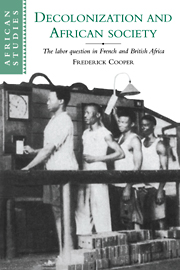Book contents
- Frontmatter
- Contents
- List of tables and figure
- Preface
- List of abbreviations
- Map of French and British colonial Africa
- 1 Introduction
- Part I The dangers of expansion and the dilemmas of reform
- Part II Imperial fantasies and colonial crises
- Part III The imagining of a working class
- Introduction
- 7 The systematic approach: the French Code du Travail
- 8 Family wages and industrial relations in British Africa
- 9 Internationalists, intellectuals, and the labor question
- Conclusion: labor and the modernizing state
- Part IV Devolving power and abdicating responsibility
- Conclusion
- Notes
- Bibliography
- Index
- OTHER BOOKS IN THE SERIES
8 - Family wages and industrial relations in British Africa
Published online by Cambridge University Press: 22 February 2010
- Frontmatter
- Contents
- List of tables and figure
- Preface
- List of abbreviations
- Map of French and British colonial Africa
- 1 Introduction
- Part I The dangers of expansion and the dilemmas of reform
- Part II Imperial fantasies and colonial crises
- Part III The imagining of a working class
- Introduction
- 7 The systematic approach: the French Code du Travail
- 8 Family wages and industrial relations in British Africa
- 9 Internationalists, intellectuals, and the labor question
- Conclusion: labor and the modernizing state
- Part IV Devolving power and abdicating responsibility
- Conclusion
- Notes
- Bibliography
- Index
- OTHER BOOKS IN THE SERIES
Summary
Something like the French Code du Travail was not a solution available to the British Colonial Office. Legislation had to come from individual colonies and their governors, and Whitehall in the late 1940s was trying to show that it was giving colonies more of a voice in their own affairs. Where settlers were a factor, they got the first chance to use Legislative Councils, whereas in French Africa the influence of colons and commercial was diluted and subordinated to the larger tasks of post-war imperialism. The Colonial Office could often do little more than try to “inculcate a sense of urgency” into colonial governors in regard to his policy initiatives. The tension between imperial center and colonial periphery made it difficult to paper over the ambiguity – felt in London as well as Nairobi – between modernizing reforms and deeply-rooted ideas about race and African culture.
The absence of an institutional capability to act on a pan-African scale was not, for British policy makers, altogether a bad thing. It meant there was no incentive for African trade unionists to organize on a similar scale. The French West African strike intended to influence the code debate in 1952 or those over its implementation would have no anglophone equivalent. No regional trade unions emerged comparable to the West African CGT, and unions had trouble focusing at an empire-wide level on issues of equality with metropolitan workers.
- Type
- Chapter
- Information
- Decolonization and African SocietyThe Labor Question in French and British Africa, pp. 323 - 360Publisher: Cambridge University PressPrint publication year: 1996
- 1
- Cited by

